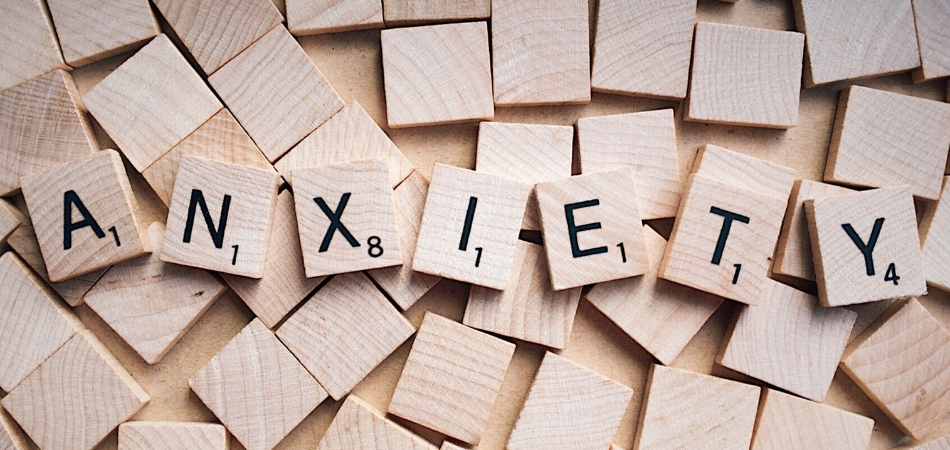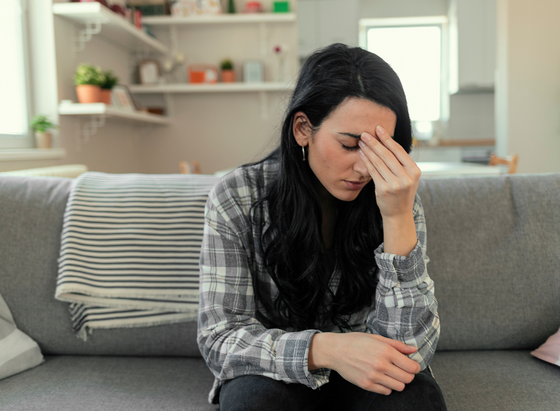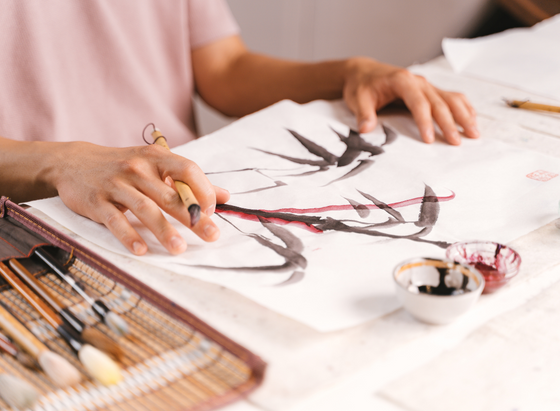Anxiety and addiction

Written by:
Last Updated:
June 23rd, 2025
Anxiety strikes most of us at some time and it is generally considered to be a normal part of life. However, people who have an anxiety disorder may suffer from it continuously, regardless of whether or not there is an actual cause. Today in the United Kingdom, over eight million individuals live with an anxiety condition on a daily basis.
Anxiety disorders and addiction often go hand-in-hand, which is known as a co-occurring disorder or dual-diagnosis. This often happens because people turn to drugs, alcohol or addictive behaviours to help cope with their anxiety. The issues come, however, as anxiety and addiction fuel and feed off of each other, making it difficult to manage both conditions. If you are suffering from anxiety and addiction, it is important to seek professional help to help you manage and overcome the conditions.

What is anxiety?
In general, anxiety is a feeling of fear or worry that can range from mild to severe. For some people, anxiety is something that they feel daily and for others, it may only happen in certain situations or when faced with particular triggers.
Some common times people may feel anxiety include:
- Before an important exam
- During a job interview
- When meeting new people
- Going on a date
- When speaking in public
Anxiety can manifest itself in both physical and psychological symptoms. Social anxiety symptoms, for example, include sweating, rapid heartbeat and feeling nauseous, feeling like your heart is racing or that you are short of breath. Others may feel dizzy, lightheaded or nauseous. Psychological symptoms can include feeling tense, on edge or having difficulty concentrating.
What are anxiety disorders?
While they share some of the same symptoms, anxiety and anxiety disorders are not the same thing. There are different types of anxiety disorders that people may suffer from which can cause or worsen addiction in some way. The most common anxiety disorders are:
Generalised anxiety disorder (GAD) – This is when a person feels anxious about a range of situations and issues, rather than one specific event. GAD can inflame addictions as the constant anxiety leads to constant attempts to self-medicate the symptoms using substances or addictive behaviour.
Social anxiety disorder – Also known as social phobia, this is when a person feels extremely anxious about social situations, such as meeting new people or speaking in public. Social anxiety symptoms include sweating, rapid heartbeat and feeling nauseous which often leads to people taking substances before, during or after intimidating events. If this becomes the only way you can cope with these occasions then frequent substance abuse can quickly lead to addiction.
Panic disorder – This is when a person experiences regular panic attacks, which are sudden periods of intense fear or anxiety. Using various medications and substances (prescribed or unprescribed) is common for panic disorder and this is a common path to addiction.
Obsessive-compulsive disorder (OCD) – This is when a person has intrusive and unwanted thoughts (obsessions) that make them feel very anxious. They may also feel the need to carry out certain behaviours or rituals (compulsions) to try and ease their anxiety. Some people with OCD turn to substances to lessen these symptoms and this substance abuse can ultimately lead to addiction (which, incidentally, is also a compulsive disorder as you feel compelled to take substances or engage in addictive activities.)
Suffering from an anxiety disorder can have a big impact on day-to-day life. It can make it hard to concentrate at work, socialise with friends or family and can generally make you feel quite low.
Why do addiction and anxiety disorders co-occur?
Addiction is defined as not being able to control substance use or engagement in a certain behaviour, despite it having a negative impact on your life. People who suffer from mental health conditions such as anxiety disorder often develop addictions because they are self-medicating in an attempt to ease their symptoms. One common example is the use of cannabis which is often used to try and relieve anxiety but can actually make the symptoms worse in the long term and quickly lead to addiction.
People with anxiety disorders may also develop an addiction because they are trying to avoid or escape from the situations that trigger their anxiety. For example, there are many people who drink alcohol before social events to try and calm their nerves. This common behaviour is known as “Dutch courage”. For people with anxiety disorders, however, this can lead to them becoming dependent on alcohol entirely because they are using it as a crutch to deal with their anxiety.
The problem with using substances or engaging in addictive behaviours to cope with anxiety is that it quickly becomes a vicious cycle. The anxiety symptoms may improve in the short term, but the addiction will make the anxiety worse in the long term. This will then fuel the addictive behaviour as you need more and more to cope with the exacerbated anxiety symptoms, which can leave you feeling trapped and like you have no way out.
Myths about addiction and anxiety disorder
It is important to dispel common misconceptions and misunderstandings about anxiety and addiction for those who have never dealt with these conditions, as it can be difficult to understand what afflicted individuals go through on a daily basis. Here are some common myths about addiction and anxiety and the truth behind them:
“Anxiety disorder is just the same as being stressed”
This is one of the most common myths about anxiety disorders. It is important to understand that stress and anxiety are not the same things. Stress is a normal physiological response to a perceived threat, such as an upcoming work deadline. This stress response is natural and temporary. Anxiety disorder, on the other hand, is a much more long-lasting condition that can have a big impact on day-to-day life.
“Anxiety and addiction are all in your head”
Another common myth about anxiety and addiction is that it is all in your head and that you can just choose to snap out of it. Telling someone with an anxiety disorder to just stop worrying is like telling someone with a broken leg to just stop being in pain. It doesn’t work like that. Anxiety is a real medical condition with very real physical symptoms. Likewise, addiction is a serious condition with both psychological and physical effects. They are not a choice, and they are not something that you can just control or ignore, particularly if you are suffering from both as co-occurring disorders.
“There is no treatment for anxiety and addiction”
This is a huge misconception and couldn’t be further from the truth. Addiction and anxiety disorders are both treatable conditions. In fact, there are many different types of treatment available for both addiction and anxiety, ranging from medication to therapy. At Sanctuary Lodge, we treat a huge number of people with co-occurring addiction and anxiety disorders. While we are exclusively an addiction treatment centre, overcoming your addiction can have a huge impact on your anxiety levels, and vice versa.
How Sanctuary Lodge can benefit your anxiety through addiction treatment
While you are undergoing rehab treatment at Sanctuary Lodge, you will take part in a number of holistic therapies which have been shown to also help with the symptoms of anxiety. These include:
- Cognitive Behavioural Therapy (CBT): CBT is a talking therapy that is used in addiction treatment to help you manage the thoughts, emotions and behaviours that can fuel and result from addiction. However, CBT can also be particularly helpful in treating anxiety as it teaches you how to identify and challenge any negative or unhelpful thoughts you may have.
- Mindfulness: Mindfulness is a form of meditation that rehab clients undergo to help focus on the present moment. This allows them to become more aware of their thoughts and feelings, such as when they are experiencing cravings. Likewise, mindfulness practice has been shown to be effective in reducing stress and anxiety as it will enable you to stay in control during situations you usually find difficult.
- Art Therapy: Art therapy is a form of expressive therapy that uses art as a means of communication in addiction treatment when people feel shy or self-conscious about opening up. Art therapy can also be helpful in treating anxiety as it allows you to express yourself in a creative way, without the need for words.
- Group Therapy: Group therapy provides those with addictions with the opportunity to share experiences and feelings with others who are going through similar things. Participating in group therapy during addiction treatment, however, can also provide you with tools for coping with social anxiety disorder as you can practise speaking to new people in a safe environment.
While Sanctuary Lodge does not treat anxiety itself, the therapies and support available as part of our addiction treatment programmes can help to alleviate the symptoms of anxiety and give you powerful tools for coping long-term. Our team are also experienced in supporting those with co-occurring disorders and will ensure that you receive any medication that has been prescribed to you during your time at Sanctuary Lodge so that your anxiety is fully managed.
What to do next
Reaching out for help with an addiction can be scary for anybody, let alone someone who is also struggling with anxiety. However, addiction treatment can have a hugely positive impact on your life and help enormously with your anxiety symptoms. At Sanctuary Lodge, we understand the unique challenges that come with addiction and anxiety, and our team is here to support you every step of the way.
If you are struggling with addiction and anxiety, get in touch with us today. Our experienced team will be able to provide you with the information and guidance you need to get started on your road to recovery.





